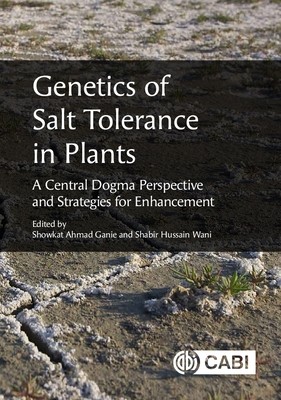
- We will send in 10–14 business days.
- Publisher: CABI
- ISBN-10: 1800623011
- ISBN-13: 9781800623019
- Format: 17.6 x 24.6 x 1.4 cm, kieti viršeliai
- Language: English
- SAVE -10% with code: EXTRA
Genetics of Salt Tolerance in Plants (e-book) (used book) | bookbook.eu
Reviews
Description
Gene expression in cells follows a prescribed pathway that conforms to the Central Dogma; where the genetic information stored in DNA is transcribed into RNA and then expressed into proteins, which influences most plant traits. Plant salt tolerance research is directed towards identifying nucleotide variants that could contribute to tolerant phenotypes. This book comprehensively presents the current state of knowledge on plant salt tolerance through meticulous analysis of the processes operating across the Central Dogma. It provides a detailed account of modulation of gene expression through genome editing systems to achieve crop improvement against salt stress. It also provides state-of-the-art information on advances in breeding technologies of genome selection and accelerated de novo domestication for rapidly improving the salt tolerance of plants for global food security.
This book: 1. Provides comprehensive coverage of plant salt tolerance mechanisms. 2. Spotlights various factors functioning along the Central Dogma pathway and their regulation in response to salinity. 3. Examines how these factors function to protect the plants from high salinity. 4. Highlights advances in cutting-edge breeding technologies for improving salt tolerance. The book will be of particular value to students and researchers of plant genetics, molecular biology and physiology and those with an interest in salinity and salt tolerance.EXTRA 10 % discount with code: EXTRA
The promotion ends in 23d.12:30:07
The discount code is valid when purchasing from 10 €. Discounts do not stack.
- Publisher: CABI
- ISBN-10: 1800623011
- ISBN-13: 9781800623019
- Format: 17.6 x 24.6 x 1.4 cm, kieti viršeliai
- Language: English English
Gene expression in cells follows a prescribed pathway that conforms to the Central Dogma; where the genetic information stored in DNA is transcribed into RNA and then expressed into proteins, which influences most plant traits. Plant salt tolerance research is directed towards identifying nucleotide variants that could contribute to tolerant phenotypes. This book comprehensively presents the current state of knowledge on plant salt tolerance through meticulous analysis of the processes operating across the Central Dogma. It provides a detailed account of modulation of gene expression through genome editing systems to achieve crop improvement against salt stress. It also provides state-of-the-art information on advances in breeding technologies of genome selection and accelerated de novo domestication for rapidly improving the salt tolerance of plants for global food security.
This book: 1. Provides comprehensive coverage of plant salt tolerance mechanisms. 2. Spotlights various factors functioning along the Central Dogma pathway and their regulation in response to salinity. 3. Examines how these factors function to protect the plants from high salinity. 4. Highlights advances in cutting-edge breeding technologies for improving salt tolerance. The book will be of particular value to students and researchers of plant genetics, molecular biology and physiology and those with an interest in salinity and salt tolerance.

Reviews